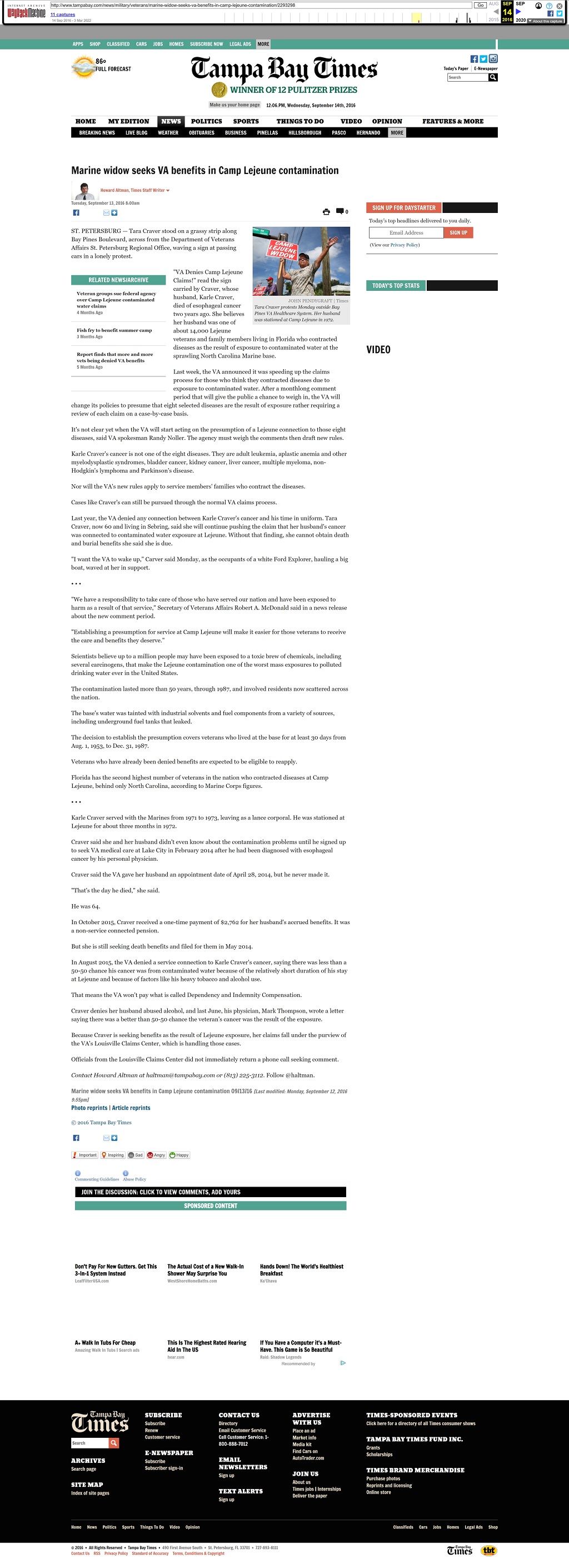
News / Military
By Howard Altman / Tampa Bay Times / September 13, 2016
PHOTO: Tara Craver protests Monday outside Bay Pines VA Healthcare System. Her husband was stationed at Camp Lejeune in 1972. (JOHN PENDYGRAFT | Times)
ST. PETERSBURG — Tara Craver stood on a grassy strip along Bay Pines Boulevard, across from the Department of Veterans Affairs St. Petersburg Regional Office, waving a sign at passing cars in a lonely protest.
“VA Denies Camp Lejeune Claims!” read the sign carried by Craver, whose husband, Karle Craver, died of esophageal cancer two years ago. She believes her husband was one of about 14,000 Lejeune veterans and family members living in Florida who contracted diseases as the result of exposure to contaminated water at the sprawling North Carolina Marine base.
Last week, the VA announced it was speeding up the claims process for those who think they contracted diseases due to exposure to contaminated water. After a monthlong comment period that will give the public a chance to weigh in, the VA will change its policies to presume that eight selected diseases are the result of exposure rather requiring a review of each claim on a case-by-case basis.
It’s not clear yet when the VA will start acting on the presumption of a Lejeune connection to those eight diseases, said VA spokesman Randy Noller. The agency must weigh the comments then draft new rules.
Karle Craver’s cancer is not one of the eight diseases. They are adult leukemia, aplastic anemia and other myelodysplastic syndromes, bladder cancer, kidney cancer, liver cancer, multiple myeloma, non-Hodgkin’s lymphoma and Parkinson’s disease.
Nor will the VA’s new rules apply to service members’ families who contract the diseases.
Cases like Craver’s can still be pursued through the normal VA claims process.
Last year, the VA denied any connection between Karle Craver’s cancer and his time in uniform. Tara Craver, now 60 and living in Sebring, said she will continue pushing the claim that her husband’s cancer was connected to contaminated water exposure at Lejeune. Without that finding, she cannot obtain death and burial benefits she said she is due.
“I want the VA to wake up,” Carver said Monday, as the occupants of a white Ford Explorer, hauling a big boat, waved at her in support.
“We have a responsibility to take care of those who have served our nation and have been exposed to harm as a result of that service,” Secretary of Veterans Affairs Robert A. McDonald said in a news release about the new comment period.
“Establishing a presumption for service at Camp Lejeune will make it easier for those veterans to receive the care and benefits they deserve.”
Scientists believe up to a million people may have been exposed to a toxic brew of chemicals, including several carcinogens, that make the Lejeune contamination one of the worst mass exposures to polluted drinking water ever in the United States.
The contamination lasted more than 50 years, through 1987, and involved residents now scattered across the nation.
The base’s water was tainted with industrial solvents and fuel components from a variety of sources, including underground fuel tanks that leaked.
The decision to establish the presumption covers veterans who lived at the base for at least 30 days from Aug. 1, 1953, to Dec. 31, 1987.
Veterans who have already been denied benefits are expected to be eligible to reapply.
Florida has the second highest number of veterans in the nation who contracted diseases at Camp Lejeune, behind only North Carolina, according to Marine Corps figures.
Karle Craver served with the Marines from 1971 to 1973, leaving as a lance corporal. He was stationed at Lejeune for about three months in 1972.
Craver said she and her husband didn’t even know about the contamination problems until he signed up to seek VA medical care at Lake City in February 2014 after he had been diagnosed with esophageal cancer by his personal physician.
Craver said the VA gave her husband an appointment date of April 28, 2014, but he never made it.
“That’s the day he died,” she said.
He was 64.
In October 2015, Craver received a one-time payment of $2,762 for her husband’s accrued benefits. It was a non-service connected pension.
But she is still seeking death benefits and filed for them in May 2014.
In August 2015, the VA denied a service connection to Karle Craver’s cancer, saying there was less than a 50-50 chance his cancer was from contaminated water because of the relatively short duration of his stay at Lejeune and because of factors like his heavy tobacco and alcohol use.
That means the VA won’t pay what is called Dependency and Indemnity Compensation.
Craver denies her husband abused alcohol, and last June, his physician, Mark Thompson, wrote a letter saying there was a better than 50-50 chance the veteran’s cancer was the result of the exposure.
Because Craver is seeking benefits as the result of Lejeune exposure, her claims fall under the purview of the VA’s Louisville Claims Center, which is handling those cases.
Officials from the Louisville Claims Center did not immediately return a phone call seeking comment.
Wayback image

